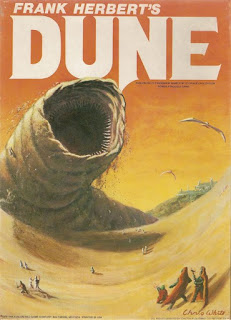Hitchhiker's Guide is, for the most part, a light hearted science fiction story that follows likable and interesting characters. The humans feels real and the aliens even have human qualities, particularly Ford Prefect, who does his best to blend in with human society.
However, on a deeper level, the story makes a pretty serious and profound comment on what it means to be human, on a small planet in a giant universe. There is a world that we live in that mostly exists within our own head and we have priorities and concerns that are much smaller in reality than they are in our minds. Hitchhiker's does a fantastic job of breaking though that illusion and showing us the bigger and more true picture.
It is a humbling story that would seem like it could only be told in a scathing or cynical manner... but to my surprise, and liking, it is actually a very hopeful and positive experience. What we often think we are is far more significant than what we probably are and the dosage of "truth" that hitchhiker's offers up is a refreshing one. I really liked this story all in all.













